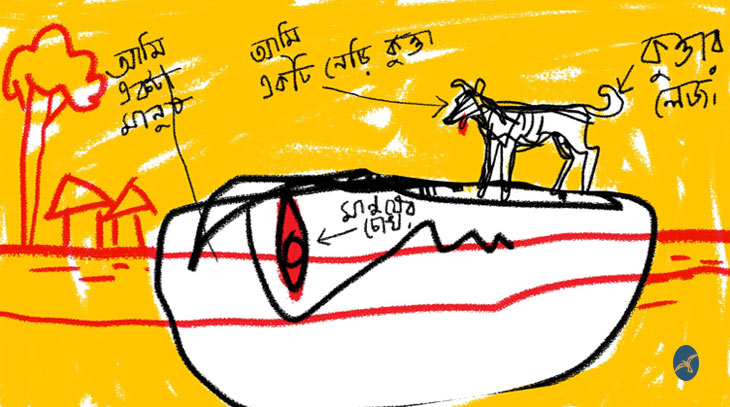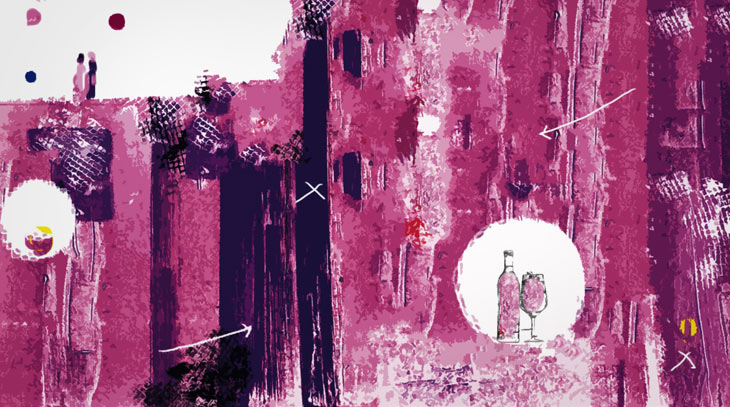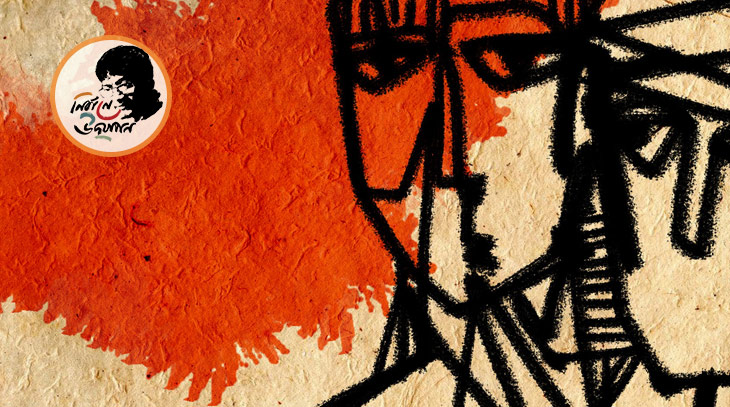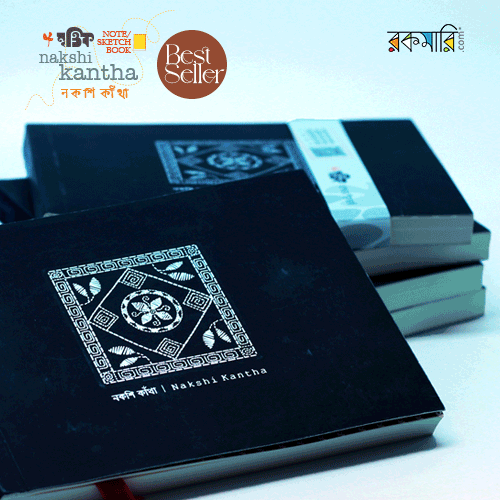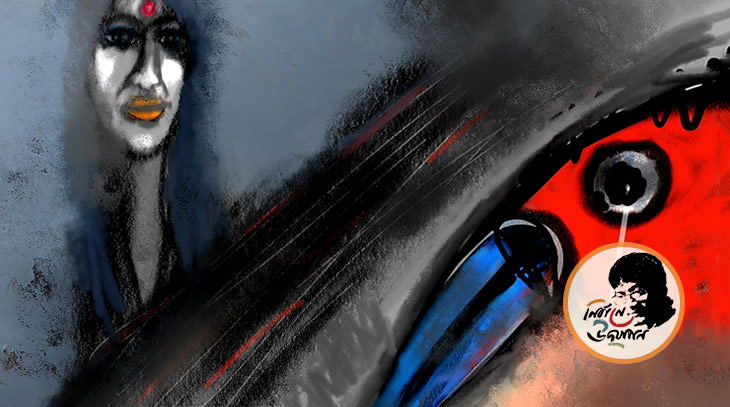
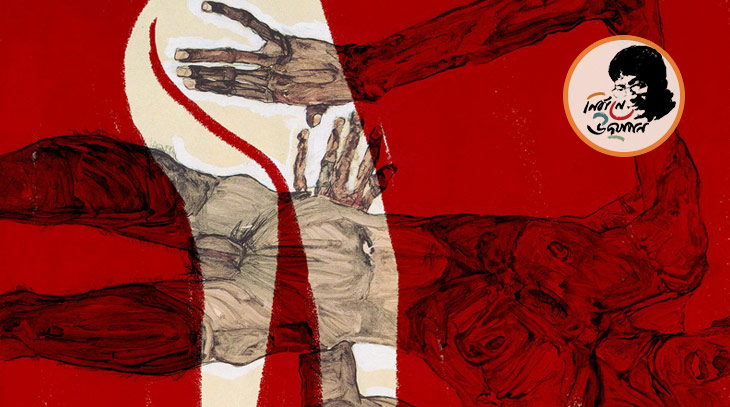
Subrata Sengupta and the Contemporary Bengali Society
The shackles of his consciousness, which was so long entangled inside of it, crushed suddenly on March 22. The tattoo, which he almost forgot of his dead father on his or Subrata’s backbone, remained an obstacle to the evolution of his talent. And thus like the voodoo, everything pervaded Subrata’s life from his childhood to the present. And so the secret bio-data of Subrata Sengupta, his despair and failures and mortification and the chain of happenings: the days of his soaked nappies, adolescence, sexual life, his passion for the leftist politics and his being tuned in with social immoralities are presented in this way as it seems to be perfect for the readers here.
1. Nagendranath Sengupta was Subrata’s father. Grandpa Jogendranath reared Nagendrath just as he was himself reared by his grandpa Surendranath Sengupta. Probably it was Surendranath who introduced prose in the toothpaste style in the name of short stories during the pre-Tagore period and managed to have puzzled the Bangalee readers with melodramatic tales. Rabindranath in his quick production of stories like Chhuti (The Farewell), Monihara (The Person Who Lost the Gem) or Dristidaan (Bringing Light to the Eye) manifested an influence of this style upon himself.
2. Subrata Sengupta passed his bachelor degree in 1984. He has four sisters of four different kinds. Subrata is fair and short, wears a moustache, usually puts on a white shirt and black trousers, and keep long hair. He spits out of his mouth when he keeps on talking for a longer time. Quite a bit healthy he is. Nagendranath had an oil mill, which is now owned by Subrata. Nagendranath earned quite a lot in the sub-divisional town and spent a lot, too. “Money is justified when it is spent,” he used to say if someone talked about that. Bijoynagar School is just a quarter mile behind Nagendranath’s oil mill. Behind the school were a tiny dead river, bushes and gardens. Here Subrata first took up pencil i.e. started his studies. Murarimohan Datta was the headmaster of Bijoynagar School at that time. He went to India in his last age. One of his sons now works in the editing department of an English-language daily in Bangladesh.
3. Nagendranath died of heart attack when he was 45. But he was a very strong man and of the furious kind, too. Subrata once in his childhood mistook his father for a ghost. That night Nagendranath returned home, drunk and hobbling with a loaf of bread, and just got angry with Subrata’s mother rebuking him for the noise he made. Perhaps Nagendranath despised his wife’s strong personality from the heart. He looked around to do something vicious and found the dead rotten cat at the corner of the stairs. On a fit of the moment Nagendranath stooped and started tearing the loaf, looking at its rotten flesh. His wife at this sight lost her sense and fell down. Nagendranath vomited and hastily washed his mouth.
Following is a narration of Subrata’s educational life, problems of his psychological development and political life in detail:
Subrata’s fame and reputation spread out in his school for his well-mannered behaviour, his use of sweet language and respect for the elders there. Murarimohan Datta loved him just as his own son. He always proved himself a meritorious student. Led by him, the Bijoynagar School Football Team participated in the inter-district football tournament as the champion for three times. He got scholarship in class eight. Subrata came to knew many in the sub-divisional town he lived in. When he was in class ten, he got acquainted with Jaglul, who was of the same age. Jaglul had stopped his studies by that time: but he could speak quite good English. He didn’t earn anything and yet lived on the earnings of his brothers who didn’t dare enrage him for anything because they were afraid of his violent nature. Once Jaglul told Subrata that he had about twelve gangsters in his control and if they can handle them properly, all in the town would fear them both. Jaglul had the immense capacity to influence people: Subrata agreed with him. Later Subrata and Jaglul along with their group committed many small-scale crimes one after another. Nagendranath didn’t say anything much to his son because many of his established friends just came to his house to see how Subrata was faring. The Officer In-Charge of the police station also for some unknown reason was very fond of Subrata.
After sometime as he was intelligent and angry, Subrata made a very good result in the SSC examination by adopting different means. From this time on, Nagendranath let his son completely loose. This time around, Jaglul began to inspire him to take big cases. Initially Subrata kept mum not responding to him. Then Jaglul came with this proposal: Sourin, an old friend of his had a cloth store. Opposite his store was another shop owned by a man called Shekhar who took away Sourin’s clients to his own shop by force. If they battered him as much necessary for Shekhar, Sourin would treat them with Vat-69. Subrata consented as he thought of it as a mere thing. But Sourin tapped Jaglul that if he could stab Shekhar during the fight, he would secretly buy him a motorcycle. Subrata didn’t know anything about this. Bad luck for Sourin. The man whom Jaglul instructed to stab Shekhar mistakenly attacked Sourin’s younger brother, who was present on the scene at that time of fight.
Still after this incident, Jaglul didn’t spare Sourin. He threatened that if he didn’t get the motorbike he would tell everything to Sourin’s elder brother. Finally Sourin had to spend eight thousand bucks to buy him an old Suzuki-80.
At this time a new man arrived into the town. He was a total stranger, Ilias by name. For a long time he was involved with underground politics. Day by day a sort of intimacy grew up between Subrata and Ilias. Ilias gave him Subrata Je Golper Shesh Nei (The Tale That Never Ends) by Debiproshad Chattopadhay, Maoer Pachti Probondho (Five Essays of Mao), Notun Manob Samaj (New Human Society) by Rahul Sankskrytyan. Subrata read the books but didn’t make much effort to understand them; he was busy in understanding much of Ilias for he badly needed firearms at that time. Ilias had a huge store of them, Subrata knew that before.
A florescent bulb needs the help of a starter to light. In the same way the nozzle of the gun is the source of power. So it needs to eliminate those class-enemies. Within a couple of months, Subrata killed two of Ilias’s rivals unscrupulously in the name of executing class-enemies. Ilias rewarded Subrata and Jaglul with two rifles and a pistol. By this time Subrata got enrolled into an intermediate college. ‘Kanta o Keya’ by Falguni Mokhopadhaya seemed to be a stunning work to him.
From remote villages they brought by motorbike the necessary firearms, which were wrapped in towels and kept on the motorbike seat on which they both sat.
Sexual Life and the Basic Instincts of Subrata
Subrata had a curiosity about his mother’s body when he was eight. The intelligence of Kanchanbala Devi, his mother, was as sharp as a blade. She didn’t make much fuss about her son’s curiosity. She brought little Subrata close to her breast and said, “What are looking at so minutely?” Subrata became relieved at his mother’s reaction. She didn’t want at all the kind of feelings her son had about her to be lurking inside of him. At that age, he just braved asking, “Mother, why is your chest plump and high?” Kanchanbala was not that shocked at this question. “Women are like this,” said she, opening her blouse and bringing out her breasts, “You drank milk from here.” From then on, Subrata became much easier with his mother.
Three years later. A young teacher taught religion at Bijoynagar School, Sukumar by name. He was quite recognized as the strictest of teachers in the classroom. Wearing a yellow punjabi and carrying a cane in hand, he explained religion to the students. Students from the higher classes called him a ‘God’s bull’. It happened on a day at that time: there was a heavy downpour that day. Subrata and Sukumar lived in almost adjacent houses. Sukumar told him that day that he would have to study religion for an hour more even after school was over. As the classrooms were locked up by school-attendants, Sukumar made an excuse to Subrata to come with him for study to an isolated place beside the river behind the school. Subrata didn’t like the idea of going there. There Sukumar suddenly got hold of him and started stroking his back, buttocks and lower abdomen. Subrata objected but didn’t dare prevent him. Sukumar then half-stripped him and used him as his passive homosexual partner. It was completely a new experience for Subrata. It was true that in his childhood, he got a kind of physical delight in climbing on his friends’ backs while playing with them. He couldn’t realize when he unconsciously clutched his friend sleeping beside him. They stripped off their pants without hesitation. When he got hold of his sisters in play, a particular part of his body became swollen which both surprised and embarrassed him. But this experience with Sukumar gave Subrata the idea that the relation between his father and mother was like this. That night he wondered a lot about all these and finally inferred that babies are born through the bottom of the mothers.
After that Sukumar used Subrata for about one year. Despite the big gap of age a strange relation grew between the two. His sexual urge that was dormant in him suddenly made him lose his sense for the next several years. Although what he did was merely a human instinct but later it mortified him very deeply. It has already been said that Subrata had four sisters. The eldest was Bina, the second Konika, Dolly the third and Renuka the youngest of all, i.e. one who wiped her mother’s womb, as the saying goes. Bina was eight years older than Subrata, Konika three years younger than Bina, Dolly one year older than Subrata and Renuka nine years younger than Subrata.
One afternoon Subrata was sitting in the same bush behind Bijoynagar School. He was about 14 at that time. Dolly, his third sister, was passing with henna leaves collected in a packet from somewhere. They had a very deep affinity towards each other even if Dolly was just one year older than Subrata. Finding him sitting alone, Dolly came closer. “Come, let’s sit here and talk,” Subrata called her with what thoughts he had in mind. Dolly sat down straight off. While having a chat with her, Subrata suddenly started caressing her on her shoulders and breasts. Dolly was hesitating. Subrata then tried vehemently to hold her on to his chest. He himself didn’t know why he was acting like that. He only understood this caressing would make him feel good.
At one stage Dolly threw herself away from Subrata and walked fast towards her home. Then Subrata started feeling guilty. Yet on the same night Subrata saw in his dream that he was doing strange things with Dolly, both naked there and it hurt him even more. Once he thought to confide everything to his mother but he couldn’t. He was afraid that his mother would beat him and then drive him away.
Subrata faced something even stranger sometime later. Sukumar came with a queer request. He said that he loved Konika, Subrata’s second sister. He sought help from Subrata on this matter. Lately Subrata could not stand Sukumar. But then Subrata took his letter to Konikadi. She first refused his love, and later accepted it being much persuaded by Subrata.
Two years later Konika and Subrata got married without the consent of her family. In these two years Subrata came to know about masturbation. In the meantime, he also had sex twice with a maid who taught him about its techniques.
Twelve years later. Having passed his adolescence and youth, Subrata is a full grown man now. He now lives in the city. He is having a family with Chameli – Jaglul’s sister in a sublet apartment. Jaglul has gone to Abu Dhabi some days before. Both Subrata and Chameli are doing jobs in a garment factory. Subrata does not love Chameli as deeply as she loves him. Subrata has decided to get enrolled for a master degree. He now reads serious books. As he has become Muslim after marrying Chameli, he has become separated from his family but some contacts are there, however through letters. Bina and Dolly are happy with their own families. Konika told him that she was deeply unhappy with Sukumar. Subrata wrote a letter asking about the reasons for her unhappiness. She avoided the matter.
Meanwhile, Subrata came across Sukumar in the city. When he asked him how he was doing, Sukumar gloomily replied that he actually looked for Subrata in Konika. Subrata came to know through other people that Kanchanbala Devi had denied him as her son.
Subrata’s own account about his mental anxiety, frustration and remorse – narrated as much as possible:
Nowadays like black balls on the carom-board, circles of darkness hold him back when he closes his eyes. Yet most of the time he is capable of bearing the sensibility of his existence. He wants to forget everything in the endless ecstasy but then his social isolation makes his psychological depression quite a lot increased. Above all, what both of them earn by working hard for days is not enough to turn the wheel of their life. He cannot caress children with affection because he feels that they seem to be suspicious about him. He is afraid of looking at any girl because he is quite sure that the girl would regard him someone who indicates something obscene towards her. If he sees a police officer even in the crowd, blood spills in his heart that he would be arrested straight away. He has a very few friends, he suspects each of them, thinks that all of them intend to insult him. When a friend smokes a brand cigarette, Subrata makes taunt at him. At his factory if criticized by the production manager, his instant reaction is that he would leave the job immediately. Secretly he watches if Chameli mixes with anybody else. He has informed all of his colleagues that he is a ferocious type of man, that he came from a big respected family and that he himself didn’t keep connection with his well-established relatives. His colleagues have already learned that he did good results and played very well in school. He doesn’t booze or goes after women like other men of his age usually do. He did politics but does not have any confidence about political movements whatsoever. Any noble piece of art turns out to be obscure to him. All the time he becomes sentimental as he keeps on talking. He doesn’t want to face himself for he has already considered himself a sinner.
Interview with Subrata by the Author:
What do you think of committing suicide now?
This is all about a mere moment. You can face this moment more than once in your life. You can survive if you can overcome the compulsion of that moment.
Which is that moment?
It is when the dialectical process holds back in your being.
Is this process still active in you?
Not that much.
So you want to commit suicide?
Yes, but I cannot gather enough courage for that.
What’s the reason?
(No answer)
Is courage a genetic factor or an environmental one?
Never thought about this.
Tell something about sin.
I don’t know if there is anything like sin but there is indeed something called regret after committing a sin, the regret which is even more crushing.
Political ups and downs in the country – what’s your impression?
Nothing.
Why?
What’s the benefit of getting into trouble? Moreover, this does not have any connection with my mental problem.
Are you sure you are on the right track in judging your mental problems?
(No answer)
Was there any police case when you had committed two murders?
No. They were dangerous and branded criminals and were involved in smuggling. Later I learnt that Illias got us to kill them because they did not give them his share.
You didn’t say anything to Illias on this?
No
Why?
He is dangerous…And why should I?
Do you read poetry?
No.
Why?
I don’t understand poetry. Besides, all poems look alike nowadays!
Tell something about war.
I don’t like it.
End Part
It’s not even known whether Subrata has involved himself in some new thinking as I have reached this stage of the story.


